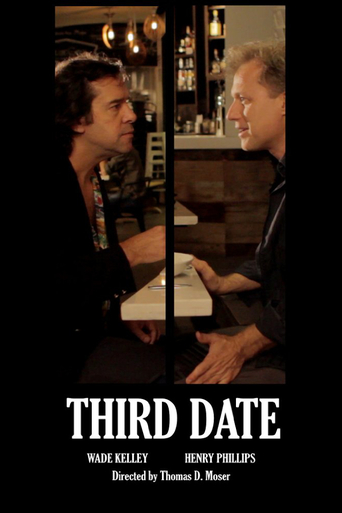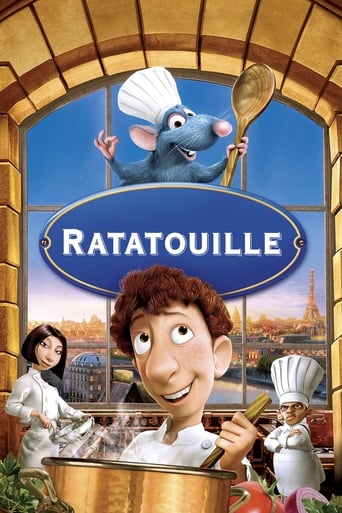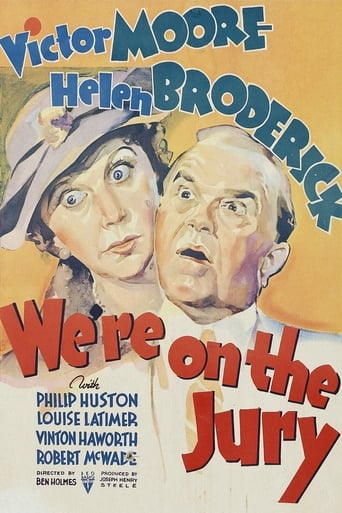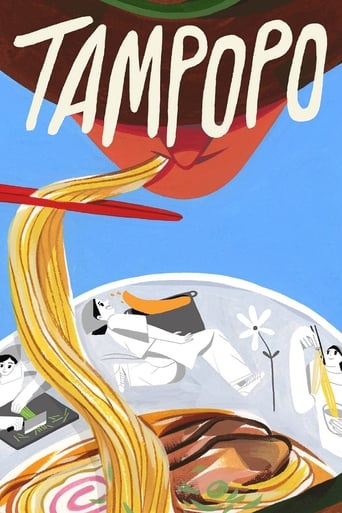
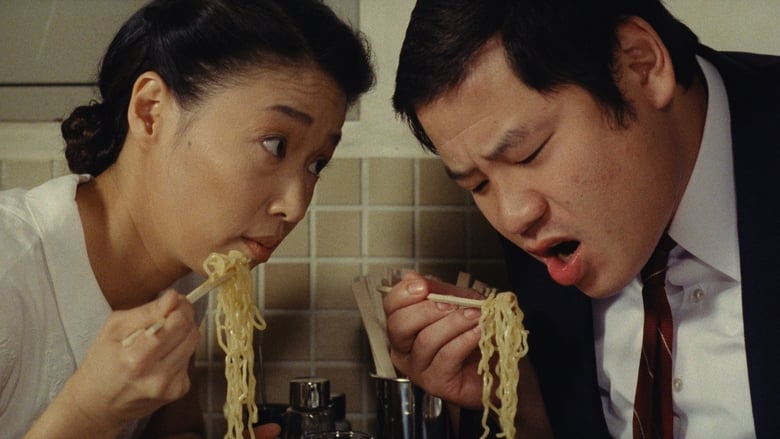
Tampopo (2016)
In this humorous paean to the joys of food, a pair of truck drivers happen onto a decrepit roadside shop selling ramen noodles. The widowed owner, Tampopo, begs them to help her turn her establishment into a paragon of the "art of noodle-soup making". Interspersed are satirical vignettes about the importance of food to different aspects of human life.
Watch Trailer
Cast


Similar titles
Reviews
I found this Japanese film in the 1001 Movies You Must See Before You Die, I jokingly thought the title (translated "dandelion") was something to do with a feminine hygiene product, it was rated very well by critics, so I hoped it would be worthwhile. Basically a pair of truck drivers, the experienced Goro (Tsutomu Yamazaki) and his younger sidekick named Gun (Ken Watanabe), stop at a decrepit roadside ramen noodle shop named "Lai Lai", owned by widowed Tampopo (Nobuko Miyamoto). The two truckers return, Tampopo asks their opinion of the noodles, Goro and Gun tell her they are "sincere, but lack character". Goro gives her advice, and she asks him to become her teacher, they turn the establishment into a place that will have the "art of noodle soup making". Goro takes her around and points out the strengths and weaknesses of her competitors, but Tampopo cannot get the broth just right, so a Noodle-Making Master is brought in for his superlative expertise. After saving the life of a wealthy old man (Hideji Otaki), from choking on his food, he lends her his chauffeur Shohei (Kinzo Sakura), who has a masterful way with noodles. Through trickery, they are also able to pry ramen secrets from their competitors, the group also change the name of the restaurant to "Tampopo". Goro previously had a fight with a customer called Pisuken (Rikiya Yasuoka), they have a rematch, ending in a draw, Pisuken reveals he is a contractor, he offers to makeover the shop's interior. Tampopo's latest effort still comes up short, so Pisuken teaches her his own secret recipe, this proves to be successful, soon customers are filling the newly redecorated shop. There are other subplots going on at the same time, including culinary knowledge in a French gourmet restaurant; a women's etiquette class on how to eat spaghetti properly; and a man in a white suit (Koji Yakusho), an elegant gangster, and his lover (Fukumi Kuroda), exploring erotic ways to use food, in the end he is shot dead, his last words to his lover are about a secret recipe for sausages. You could argue that this movie is much more about the food, the performances are all fine and it is nice simple story about transforming a failing noodle business into a successful venture, along with little spoofs of westerns and stereotypical American movie themes, characters and other stuff, but the most memorable sequences involve the preparation or eating of noodles and various other Asian and continental dishes, almost food porn, so feast your eyes on this enjoyable comedy. Very good!
Simply the best film about food I've ever seen; peppered with homages and nods to great westerns, this lovely comedy is just a pure joy to watch. Just don't watch it on an empty stomach - you'll be craving noodles within minutes. A timeless Asian classic. 8 stars out of 10.In case you're interested in more underrated masterpieces, here's some of my favorites:imdb.com/list/ls070242495
Tampopo is a comic satire about the enjoyment of food, and then some, but it could be perceived as earnest if viewing just the main narrative. Itami does not seek to expose and ridicule, but sprinkles loving touches throughout the story of a widow's struggling noodle business. In an early scene, Goro recounts how his master taught him the mysteries and treasures of the ramen bowl, and how he delicately assigns each segment its own personality; each slice of pork, each strand of noodle (smooth but strong!), the slowly sinking seaweed. Such an ode to a simple staple meal could be inserted in many films about food, and Itami only slightly exaggerates. And it's effective too - films about food should make you hungry, and imbue you with the same sense of passion for cooking as the characters do. I made noodles immediately after watching this. He reaches instead by making a familiar situation ridiculous. A lone wanderer (he has a young Ken Watanabe in tow, who does not do much) drifts into a bar on a rainy night and quietly threatens a drunk scoundrel, before being beaten soundly offscreen by 5 men (they later have a 'rematch' which ends in them congratulating on each other's prowess). Later, in a voyeuristic and mysterious moment heightened by the soundtrack, Tampopo is lead by a stranger through back alleys and grimy shops to a slit in the wall, which reveals not a secret conspiracy or cult, but a man preparing soup stock. When a rival restaurant is challenged, the stride into the scene fanned out like a posse from a western, looking for retribution. In the climatic shoot-out, the banging drums once again make this tenser than a meal could ever be, and the camera slides slowly across each taster (and here the sound design is just both incredible and funny - not horses galloping, gunshots or an iconic whistle, but slurping, slurping and more slurping), before the music crescendos with them downing the soup in unison. And after the whole affair, Goro wanders away to yet another story, like a Blondie or an Ethan Edwards. Tampopo remains earnest herself, Miyamoto giving a delightful performance. There is much played straight in the narrative of revitalising the noodle joint; lessons in dissecting each facet of the customer's body language, needs and personality, timing the preparation of each bowl and memorising orders to a tee could fit snugly into a similar movie as a training montage. In one particularly shining moment, she echoes the biting criticisms of a rival's noodles and all she has learned while bobbing in and out and behind Goro, all with the adorable creased smile on her face. She reacts to failure with teary disappointment, and to success with delight and dedication. It is in fact the aspect of playing it straight that creates much of the comedy. Food is taken very seriously, even by the homeless, who compare fine wines like they were at the dinner table, not crouching in a rubbish dump. And like true food snobs, they lament about declines in product quality and the departure of the human touch, but that is complimented by the loving way in which a rice omelette is delicately fried; maybe they do know a thing or too. They, like Tampopo, talk of food with wide eyes and sly smiles, and are completely and utterly earnest.We see the same in the little vignettes sprinkled throughout the main story, and it creates an outrageous and absurd humour. A young man sees his older colleagues all order rather plain meals, and then inquires at length about the fine cuisines on the menu, and then keeps going and going, all while he is being prodded to hurry up. Weeping children are told to finish every last bite of their meal, just like at any dinner table, only this one is cooked by the dead wife. The silence of a posh socialite lesson is invaded by the slurping of a man nearby, and then to the horror of the elder, the attempts by her students begin to form a cacophony of slurps that only increase in volume and intensity! And then there is the sort of desire that approaches sensual levels, quite literally (First, caress the pork with your chopsticks). A slurp of an oyster (a strong vaginal symbol) turns into a heated sensual exchange, and the music makes it out to be some heavenly beauty and romance. And the main couple engage in a series of fetishized sexual acts involving a struggling shrimp shrimp against the bare belly, dipping body parts into cream, and something out of a drunk party game (I've seen it with ice), which involves slipping an egg yolk between each other's mouths. This is so so sincere, and their bodies shake with delight even as I shuddered in disgust. And at the end of their own little story, the gangster has been fatally shot, and his poetic final words turn into a long winded spiel about the yam sausages and the best garnishes to go with them. This is absolutely hilarious, because first Itami hits all the usual clichés (the shhh-ing of the weeping lover, the leaving of a memento, the reminiscing of a long bygone time), second because it goes on for far longer than these death scenes usually go on, faking out the audience several times, and finally because it is still treated as absolutely serious - I mean, listen to the music. And the final image is a perfect combination of the hedonistic urges that Tampopo is made up of - a baby eagerly sucking on a mother's breast. Even an infant knows what it wants.
Funny, mesmerizing, original, both spoof and serious, Tampopo is a 'ramen western" that is secretly about bringing the best out of a woman, In this case Tampopo. With bifurcating stories about food as the bond in all human relations, from birth to death, to sex and back again, the men in the film finally get it right. Pay attention to their personal histories of loss and love, to what is thrown away, lost or devalued, In Japanese Tampopo means Dandelion,and in Japanese culture dandelions are admired for their strength and deep roots and the ability to return each spring. This film has many seed stories, tossed in so many directions your mind cannot keep them all together. A film to see and see again, over time. A bowl of noodles will never be the same again.





